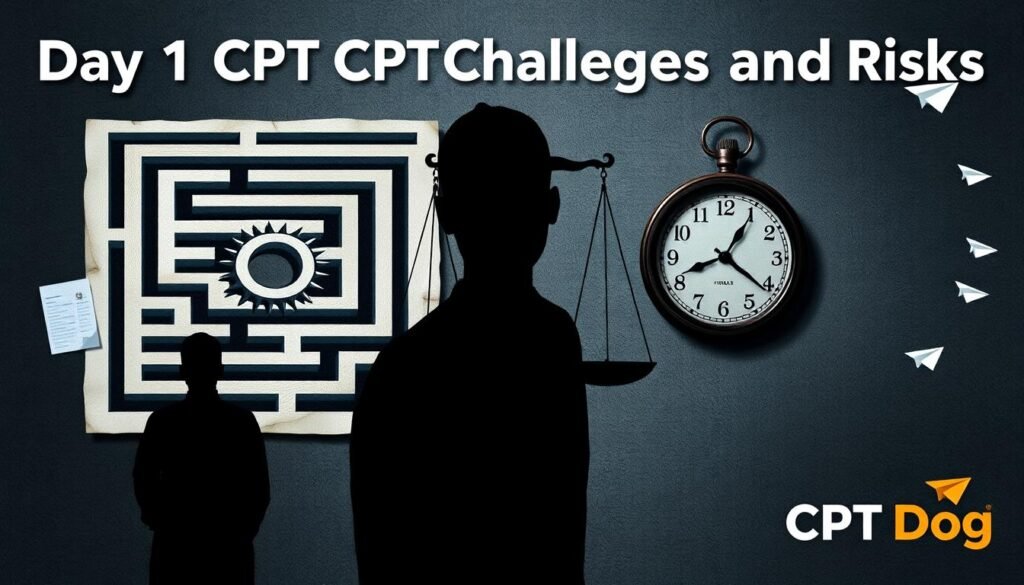Are you an international student looking to start your career in the United States? CPT Dog Day 1 CPT could be the answer to your questions. It helps you begin your professional journey while keeping your legal status intact.
Working as an international student can be tough. Day 1 CPT is a special way for students to get work experience right away. But, it’s important to know the legal rules that come with it.
The rules for Day 1 CPT are detailed and important. They can affect your immigration status. It’s key for international students to understand these rules to balance school and work.
Day 1 CPT is different from traditional CPT. It lets some students start work right when they start school. This is great for students in STEM fields and those in graduate programs.
Key Takeaways
- Day 1 CPT enables immediate work authorization for select international students
- Strict USCIS regulations govern the implementation of Day 1 CPT
- Primarily available for graduate and doctorate-level programs
- Requires careful compliance with immigration guidelines
- Offers a potential pathway to future work visas
- Involves complex application processes and documentation
What is Day 1 CPT?
Day 1 CPT is a special chance for international students to start working right away when they begin their studies. It’s a type of Curricular Practical Training (CPT) for F-1 visa holders. They can start working in their first semester of graduate school.
Definition of Day 1 CPT
Curricular Practical Training (CPT) is a work program for international students in the U.S. It’s for those studying healthcare coding and billing. Day 1 CPT lets students work from the start, giving them quick professional experience.
Eligibility Requirements for Day 1 CPT
- Enrolled in specific master’s or doctoral programs
- Maintain full-time student status
- Obtain authorization from Designated School Official (DSO)
- Work must directly relate to the student’s field of study
Key Characteristics of Day 1 CPT
| Characteristic | Details |
|---|---|
| Work Hours | Up to 20 hours during academic semesters, 40 hours during breaks |
| Application Processing | 1-3 days typical processing time |
| Required Documentation | Valid I-20, F-1 visa, employer job offer letter |
Differences Between CPT and OPT
CPT and Optional Practical Training (OPT) both offer work chances, but they’re different. CPT is part of your studies, while OPT is for after you finish. Day 1 CPT gives work authorization right away, helping students get practical experience early.
“Day 1 CPT opens doors for international students to seamlessly blend academic learning with professional development.” – U.S. Immigration Expert
Knowing these differences helps you choose the right work authorization for your studies in the U.S.
The Legal Framework Surrounding Day 1 CPT
Understanding immigration rules is key for international students. Day 1 CPT offers both chances and hurdles for students. It lets them work right away while keeping their legal status.

Overview of Immigration Regulations
The USCIS sets rules for international students using Curricular Practical Training (CPT). Important rules include:
- Students in certain master’s and doctorate programs get work authorization right away.
- They must follow strict rules to keep their F-1 visa status.
- Their practical training is closely watched.
“Students in master’s or doctorate programs that need CPT right away don’t have to wait a year.”
Role of SEVIS in CPT Compliance
The Student and Exchange Visitor Information System (SEVIS) is vital for tracking student work. It keeps records of your work and coding skills.
| SEVIS Compliance Elements | Key Requirements |
|---|---|
| Work Authorization Tracking | Always watching student work experiences |
| Program Verification | Checking if work fits with the academic program |
| Status Maintenance | Stopping unauthorized work |
It’s important for international students to know these rules. Breaking CPT rules can lead to big problems. This includes losing your F-1 visa status and facing future immigration issues.
Benefits of Using Day 1 CPT
Day 1 CPT gives international students a chance to start their careers in the U.S. right away. It lets them use their CPT code knowledge to get practical experience while they study.
Immediate Work Experience
Your journey with Day 1 CPT starts on day one. Schools like Harrisburg and Monroe have flexible programs. They let you start working right away.
These programs need:
- Just a little time on campus (once a semester)
- Weekend classes that last 2-3 days
- Online classes with evening or flexible schedules
Financial Benefits for International Students
Day 1 CPT also helps with money. International students can earn while they study. They have both full-time and part-time jobs.
- They can start working off-campus from the first year
- They need a 3.0 GPA to keep working
- They can help pay for school
“Day 1 CPT bridges the gap between academic learning and professional development for international students.”
Networking Opportunities
Day 1 CPT also opens doors for networking. By working in real jobs, you can:
- Make professional friends
- Learn about different industries
- Improve your chances in the U.S. job market
Remember, you need a valid F-1 visa and must follow the university’s rules.
Challenges and Risks Associated with Day 1 CPT
Exploring Day 1 CPT requires looking at possible hurdles for international students. Knowing these risks is key to keeping your legal status and future safe.

Potential Legal Complications
Day 1 CPT comes with legal issues that students need to think about. The main worries are:
- Potential visa status scrutiny by immigration authorities
- Risk of receiving Requests for Evidence (RFE) during H-1B applications
- Possible determination of unlawful presence
“Careful navigation of Day 1 CPT requirements is essential to avoid potential immigration complications.” – Immigration Law Expert
Employer Concerns
Employers might be cautious about hiring for Day 1 CPT due to visa doubts. They worry about:
- Verification of work authorization legitimacy
- Potential complications with future visa sponsorship
- Uncertainty surrounding long-term employment eligibility
Maintaining Visa Status
To keep your F-1 visa status while on Day 1 CPT, you need to be very careful. Students must:
- Closely communicate with Designated School Officials (DSOs)
- Ensure continuous compliance with immigration regulations
- Regularly review and update visa documentation
Tip for Success: Always talk to your university’s international student office before starting any Day 1 CPT program. They can help you understand the specific rules and risks.
Day 1 CPT is a great chance for international students, but it’s important to know the challenges. Being proactive about following the rules can help avoid problems with the coding and medical exams.
How to Apply for Day 1 CPT
Applying for Day 1 CPT needs careful planning and knowing what’s required. International students aiming for top healthcare coding spots must plan well. They need to get the right billing and coding checks.
Step-by-Step Application Process
Your Day 1 CPT adventure starts with picking a good university. Here are the main steps:
- Look for universities with Day 1 CPT programs
- Make sure the program meets USCIS rules
- Check if you’re in a graduate program that counts
- Gather all needed papers
- Send your CPT application to your DSO
Required Documentation and Support
For a CPT application to succeed, you need the right papers:
- Proof you’re in a program that matters
- A job offer letter
- A CPT agreement form
- A brief about your internship
- Proof you’re taking at least 6 credits a semester
Tips for a Successful Application
To make your Day 1 CPT application stand out, follow these tips:
“Preparation and attention to detail are crucial for a smooth CPT authorization process.”
- Apply at least 30 days before you want to start
- Keep your GPA at 3.0 or higher
- Fill out all documents correctly
- Stay in touch with your DSO
- Watch the application timeline
Universities like Westcliff University and Monroe College usually handle CPT applications in 3-10 business days. Knowing this can help you smoothly go through your Day 1 CPT process.
Best Practices for Compliance with Day 1 CPT
Day 1 CPT requires careful planning and attention to rules. Success depends on knowing immigration laws and following F-1 visa rules. Whether you’re in outpatient coding or learning ICD-10, staying updated is key.
Talking to your Designated School Official (DSO) is crucial. Make sure your work fits your studies. Document every part of your job or internship.
Keep an eye on your visa status to avoid problems. You must stay enrolled full-time and meet university rules. Keep your Form I-20 and work records up to date to stay safe.
Knowing Day 1 CPT rules well can help you succeed. Focus on clear talks, detailed records, and learning more. This way, you can grow professionally while keeping your visa in order.